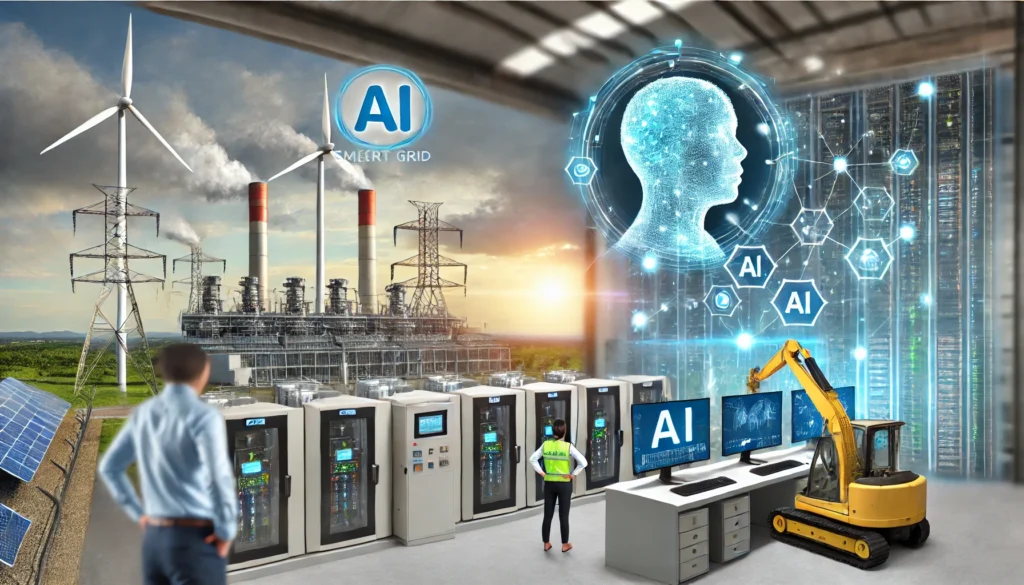The Impact of AI in the Electric Power Industry

Artificial intelligence (AI) is revolutionizing industries across the globe, and the electric power sector is no exception. From improving operational efficiency to enhancing predictive maintenance, AI has the potential to transform the way electricity is generated, distributed, and consumed. This article explores how AI is being utilized in the electric power industry and the benefits it brings to both businesses and consumers.
1. AI in Power Generation
AI technologies are making power generation more efficient by optimizing energy production processes. In traditional power plants, AI models can analyze data from sensors and equipment to predict failures and optimize operations. For example, AI-powered systems can monitor boiler efficiency, turbine performance, and fuel consumption, enabling plant operators to make data-driven decisions that improve the overall performance of the facility.
In renewable energy, AI plays a crucial role in optimizing power generation from sources such as wind and solar. Machine learning algorithms can predict weather patterns, helping energy producers forecast power generation levels more accurately. This allows for better integration of renewable energy into the grid, improving the overall efficiency and reliability of the energy supply.
2. Smart Grids and Distribution
AI is also driving advancements in smart grid technology. Smart grids use AI to monitor and control electricity distribution in real-time, ensuring that energy is delivered efficiently to consumers. Through AI-powered sensors and algorithms, smart grids can detect and respond to issues such as power outages, voltage fluctuations, and equipment malfunctions, minimizing downtime and reducing operational costs.
Additionally, AI in smart grids can help balance supply and demand more effectively. By analyzing historical data and consumption patterns, AI models can predict peak demand times and adjust the distribution of electricity accordingly, preventing overloading and optimizing grid stability.
3. Predictive Maintenance
One of the most significant benefits of AI in the electric power industry is its ability to enable predictive maintenance. In power plants and across the grid, equipment is subject to wear and tear, which can lead to costly breakdowns and downtime. AI-powered systems can predict when equipment is likely to fail by analyzing historical data and identifying patterns in performance.
For example, AI algorithms can monitor the condition of transformers, generators, and other critical infrastructure. If a potential issue is detected, maintenance can be scheduled before the equipment fails, reducing the risk of unexpected outages and minimizing repair costs. This proactive approach to maintenance helps increase the lifespan of assets and improve the overall reliability of the power supply.
4. Energy Efficiency and Consumption
AI is also helping consumers reduce energy consumption and improve energy efficiency. Smart home systems, powered by AI, can adjust heating, cooling, and lighting based on usage patterns, reducing unnecessary energy waste. Additionally, AI-driven energy management systems can provide consumers with insights into their energy usage and recommend actions to optimize efficiency, such as adjusting appliances and adjusting settings during peak hours.
For businesses and industries, AI can be used to optimize energy usage in facilities. AI systems can monitor equipment and processes to identify areas where energy consumption can be reduced. For example, in manufacturing plants, AI-powered systems can analyze production schedules and equipment usage to identify energy-saving opportunities, leading to significant cost savings.
5. AI in Grid Security
As the electric power grid becomes increasingly interconnected and reliant on digital technologies, the risk of cyberattacks and security breaches grows. AI can play a vital role in enhancing the security of power grids. AI algorithms can detect anomalies in the network, such as unauthorized access or abnormal traffic, and respond quickly to prevent cyberattacks.
Moreover, AI can help with the identification of vulnerabilities in the grid’s infrastructure. By analyzing vast amounts of data, AI can detect potential weak points in the system and recommend measures to strengthen security protocols, ensuring the integrity and resilience of the grid against malicious attacks.
Conclusion
Artificial intelligence is transforming the electric power industry, offering new opportunities to enhance operational efficiency, improve energy management, and increase the resilience of the grid. By leveraging AI technologies, companies can optimize energy production, predict maintenance needs, and improve the overall reliability and security of the power supply. As AI continues to evolve, it will undoubtedly play a central role in shaping the future of the electric power industry, enabling a more sustainable and efficient energy landscape for generations to come.
Source : Medium.com




